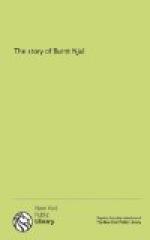CHAPTER XCVI.
OF THE CHANGE OF FAITH.
There had been a change of rulers in Norway, Earl Hacon was dead and gone, but in his stead was come Olaf Tryggvi’s son. That was the end of Earl Hacon, that Kark, the thrall, cut his throat at Rimul in Gaulardale.
Along with that was heard that there had been a change of faith in Norway; they had cast off the old faith, but King Olaf had christened the western lands, Shetland, and the Orkneys, and the Faroe Isles.
Then many men spoke so that Njal heard it, that it was a strange and wicked thing to throw off the old faith.
Then Njal spoke and said—
“It seems to me as though this new faith must be much better, and he will be happy who follows this rather than the other; and if those men come out hither who preach this faith, then I will back them well.”
He went often alone away from other men and muttered to himself.
That same harvest a ship came out into the firths east to Berufirth, at a spot called Gautawick. The captain’s name was Thangbrand. He was a son of Willibald, a count of Saxony, Thangbrand was sent out hither by King Olaf Tryggvi’s son, to preach the faith. Along with him came that man of Iceland whose name was Gudleif. Gudleif was a great man-slayer, and one of the strongest of men, and hardy and forward in everything.
Two brothers dwelt at Beruness; the name of the one was Thorleif, but the other was Kettle. They were sons of Holmstein, the son of Auzur of Broaddale. These brothers held a meeting, and forbade men to have any dealings with them. This Hall of the Side heard. He dwelt at Thvattwater in Alftafirth; he rode to the ship with twenty-nine men, and he fares at once to find Thangbrand, and spoke to him and asked him—
“Trade is rather dull, is it not?”
He answered that so it was.
“Now will I say my errand,” says Hall; “it is, that I wish to ask you all to my house, and run the risk of my being able to get rid of your wares for you.”
Thangbrand thanked him, and fared to Thvattwater that harvest.
It so happened one morning that Thangbrand was out early and made them pitch a tent on land, and sang mass in it, and took much pains with it, for it was a great high day.
Hall spoke to Thangbrand and asked, “In memory of whom keepest thou this day?”
“In memory of Michael the archangel,” says Thangbrand.
“What follows that angel?” asks Hall.
“Much good,” says Thangbrand. “He will weigh all the good that thou doest, and he is so merciful, that whenever any one pleases him, he makes his good deeds weigh more.”
“I would like to have him for my friend,” says Hall.
“That thou mayest well have,” says Thangbrand, “only give thyself over to him by God’s help this very day.”
“I only make this condition,” says Hall, “that thou givest thy word for him that he will then become my guardian angel.”




